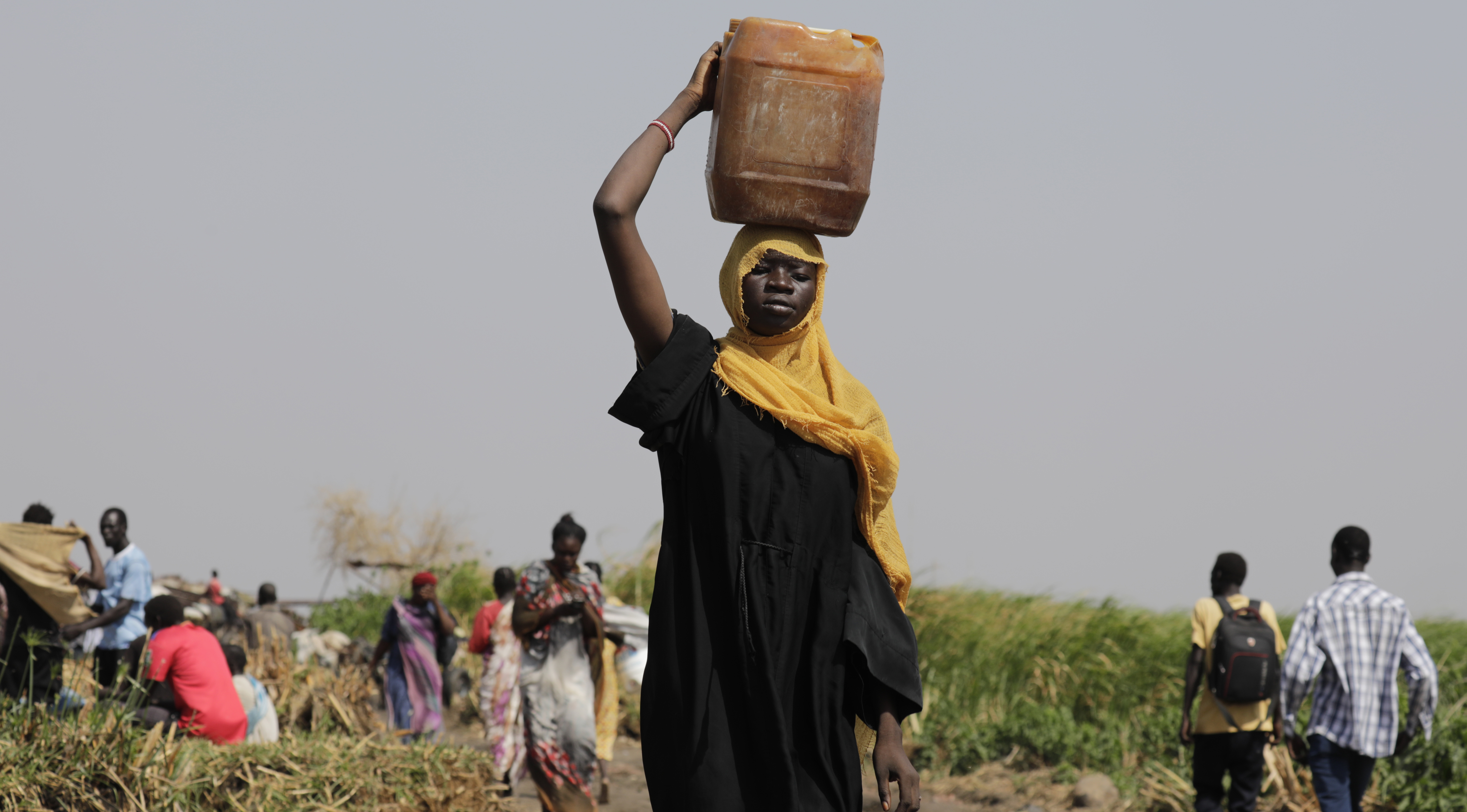Today is World Refugee Day.
It comes at a time when the plight of migrants and refugees around the world has reached an all-time low, and is tragically going to get worse and worse in years to come.
Last week a new report issued by the UN High Commissioner on Refugees (UNHCR), “Global Trends in Forced Displacement 2022”, “found that by the end of 2022, the number of people displaced by war, persecution, violence and human rights abuses stood at a record 108.4 million, up 19.1 million on a year earlier, which was the biggest ever increase”.
/file/dailymaverick/wp-content/uploads/2023/05/11466465.jpg)
The report estimated that “the upward trajectory in global forced displacement showed no sign of slowing in 2023 as the eruption of conflict in Sudan triggered new outflows, pushing the global total to an estimated 110 million by May”.
What is being deliberately overlooked (and allowed to continue) are the systemic crises that are driving a biblical flood of refugees across and into borders, over and into seas.
These numbers are staggering, but as usual the huge numbers mask the terrible human tragedy that is being inflicted on so many individual people.
It was brought home by news of the sinking of a fishing vessel off the coast of Greece on 14 June, carrying up to 750 migrants, and costing possibly as many as 500 lives. Stories are emerging of how women and children may have been locked in a refrigeration hold below deck (only men survived), and of how a Greek coastguard vessel appears to have deliberately delayed providing help.
When the ship sank it sank fast and took its human cargo to the bottom of the sea. It is said it may never be recovered.
The Mediterranean is a mass grave. In 2022, 3,789 deaths of refugees crossing the sea or the Sahara were recorded by the International Organization for Migration.
The atrocities associated with migration are becoming so common that we barely heed them. In 2022, for example, the number of desperate people crossing the English channel in flimsy boats and dinghies was 45,756 – 17,000 more than during 2021.
However, although the immediate focus has been on the people smugglers and those who are profiting from desperation, what is being deliberately overlooked (and allowed to continue) are the systemic crises that are driving a biblical flood of refugees across and into borders, over and into seas.
And the powers that are responsible for this flood.
Read more: 2023: A Moment of Truth for Global Displacement | UNHCR Spotlight
Most obviously responsible is the burgeoning of wars, and the cynical arms industry that hides behind them.

Increasingly obvious is the climate crisis. Rapid global heating is already making larger and larger parts of Earth uninhabitable because of heat, floods and the unpredictability of the climate, destroying centuries-old civilisations, patterns of crop production and cultivation.
According to the UNHCR, “an annual average of 21.5 million people were forcibly displaced each year by weather-related events – such as floods, storms, wildfires and extreme temperatures – between 2008 and 2016”.
By one estimate, that number could rise above a billion people by 2050.
It has become a common refrain of populist governments – again including ours – to fuel xenophobia and then promise ‘to stand firm on migration’.
Least obvious perhaps is our own demonstrable loss of humanity, empathy and compassion.
The strategy of most governments in the world – including ours – is to hide their own complicity in this crisis (whether through the production of carbon or weapons, or propping up authoritarian governments) by “othering” and blaming its victims.
In South Africa our government props up “comrade” Emmerson Mnangagwa and then blames the ordinary Zimbabeweans who flee a country that he has raped; the ANC cosies up to King Mswati III in Eswatini and the blame the amaSwati who can no longer survive the poverty into which he has plunged his country.
It has become a common refrain of populist governments – again including ours – to fuel xenophobia and then promise “to stand firm on migration”.
Where’s our humanity?
The response to the crisis is what is going to define our humanity in the years ahead.
How we respond, think and talk about migration challenges our humanity at the most fundamental level. Ask yourself: How do you feel about this tragedy? Do you feel it all? How do we prevent it becoming yet another abnormal ‘normal’? Are our feelings still capable of distinguishing between fictional horror and real-life events like that of the Greek ship?
Then, how do we respond? How do we resist this latest assault on our common humanity (a dividing us up not dissimilar to racism) and the attempt to divide us into have-nations and have nots, have rights and have nots?
Read more in Daily Maverick:
Mothers go one way, children another, during eviction of refugees outside UN offices in Pretoria
Perhaps the first step we have to take is to recover our own humanity and compassion: recognise that these people are children, mothers, fathers, people with dreams, fears, the capacity to feel pain and suffer – like us.
To feel what it must have been like to be on board that fateful trawler, watch the film The Swimmers on Netflix, following the journey of teenage Syrian refugees Yusra Mardini and her sister Sarah Mardini from Syria to Germany and their treacherous crossing of the Aegean Sea.
Or, closer to home, read Jonny Steinberg’s 2015 book, A Man of Good Hope, about the journey of Asad Abdullahi from Mogadishu in Somalia to Blikkiesdorp.
Or watch Mike van Graan’s play about migration, When Swallows Cry.
Check yourself before you too easily pass on misinformation that “foreigners” are responsible for South Africa’s crime or unemployment crisis.
/file/dailymaverick/wp-content/uploads/2023/06/MC-Tues-editorial-World-Refugee-Day-Main-option-2.jpg)
Consider what we should do, and what we should demand of our government and political parties to humanely address a migration crisis that will get worse and worse in southern Africa as well.
There’s no doubt that migration on the scale that is now occurring is a challenge to the resources of every nation, but a response based on human rights and inclusion is possible, particularly if we reclaim our democracies, stamp out corruption and prioritise social investment in realising the rights of the poor – as is required by the Constitution in South Africa.
Failing that, the refugee crisis that we are seeing explode in 2023 is a portent of a near future. It points to a world where billions of people are going to be locked out: assaulted by nature and other human beings, denied peace, dignity, love, protection, recognition, food, the most fundamental of human rights.
A world of walls, guns and prisons.
On World Refugee Day 2023 it’s time we discovered our common humanity and resolved to become activists for a just and sustainable future. DM





 A South Sudanese woman carries a bucket of water from the Nile in the vicinity of the fluvial port of Renk on 14 May 2023 (issued 15 May 2023). According to the United Nations, about 200,000 people fled the conflict in Sudan between 15 April and 12 May 2023. Most of them left towards neighbouring countries such as Egypt, Tchad, South Sudan or Ethiopia, and about two million people were internally displaced. (Photo: EPA-EFE / Amel Pain)
A South Sudanese woman carries a bucket of water from the Nile in the vicinity of the fluvial port of Renk on 14 May 2023 (issued 15 May 2023). According to the United Nations, about 200,000 people fled the conflict in Sudan between 15 April and 12 May 2023. Most of them left towards neighbouring countries such as Egypt, Tchad, South Sudan or Ethiopia, and about two million people were internally displaced. (Photo: EPA-EFE / Amel Pain)